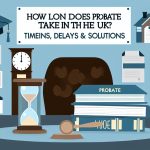Table of Contents

Probate, the legal process of administering a deceased person’s estate, often carries a shroud of mystery and misinformation. It’s a topic that tends to be surrounded by myths and misconceptions that can lead to unnecessary worry and confusion for those facing this process.
That’s why the team at Swansea Legal Solutions would like to debunk some of the most common myths and misconceptions about probate to provide clarity and a better understanding of what to expect.
Myth 1: Probate Is Always Lengthy and Expensive
One of the most prevalent misconceptions about probate is that it is always a lengthy and costly process. While probate can take several months to complete, especially for complex estates, it doesn’t have to be prohibitively expensive. Simple estates with clear documentation can move through probate relatively swiftly, and costs can be controlled through prudent planning.
Myth 2: All Assets Go Through Probate
Not all assets are subject to probate. Many assets can bypass probate, such as those held in joint tenancy, assets with designated beneficiaries (e.g., life insurance policies or retirement accounts), and assets held in a living trust. Understanding which assets do not go through probate is crucial for efficient estate planning.
Myth 3: Probate Is Public and Invades Privacy
While probate records are generally a matter of public record, this doesn’t mean that all your financial and personal details become public knowledge. Most countries have provisions for keeping specific information, such as the value of assets, confidential. Privacy concerns can often be addressed with effective estate planning strategies, including the use of living trusts.
Myth 4: Probate Is Only for the Wealthy
Probate is not exclusive to the wealthy. It applies to estates of all sizes. The complexity and duration of probate may vary, but even individuals with modest estates should consider estate planning to minimize probate’s impact on their beneficiaries.
Myth 5: Probate Always Results in Family Disputes
Probate does not inherently lead to family disputes. In many cases, the process proceeds smoothly when the deceased’s intentions are clear, and there are no disagreements among heirs. Family conflicts during probate often arise from pre-existing tensions or a lack of communication. Proper estate planning can help reduce the risk of disputes.
Myth 6: Executors Have Complete Control Over the Estate
Executors, or personal representatives, do not have absolute control over the estate. Their role is to follow the deceased’s wishes as outlined in the will and adhere to the laws governing probate. They must act in the best interests of the estate and its beneficiaries, and their actions are subject to court supervision.
Myth 7: Probate Eliminates All Debts
Probate doesn’t automatically erase all the debts of the deceased. Outstanding debts are typically paid from the estate’s assets during probate. If the estate lacks sufficient assets to cover all debts, the remaining unpaid debts generally do not pass on to the deceased’s heirs.
Swansea Legal Solutions
Understanding the common myths and misconceptions about probate is crucial for informed estate planning. While probate can be a complex process, it is not always as daunting or problematic as these myths suggest.
By seeking professional guidance and planning ahead, individuals can navigate probate efficiently and ensure their wishes are carried out accurately, ultimately reducing the burden on their loved ones during a difficult time. Don’t let misconceptions cloud your understanding of probate; instead, take proactive steps to manage your estate effectively by call Swansea Legal Solutions today on 01792 420844.
- Common Probate Mistakes That Cost UK Families Time and Money – 15 January 2026
- Executor Responsibilities in the UK: What You’re Legally Required to Do – 12 January 2026
- The True Cost of Probate in the UK: Fees, Taxes, and Hidden Charges – 9 January 2026







Leave a Reply
You must be logged in to post a comment.